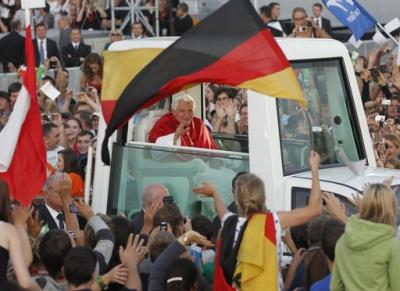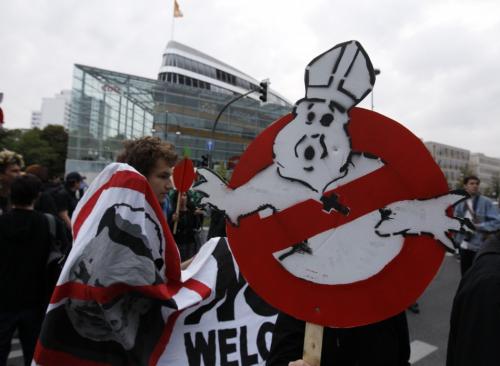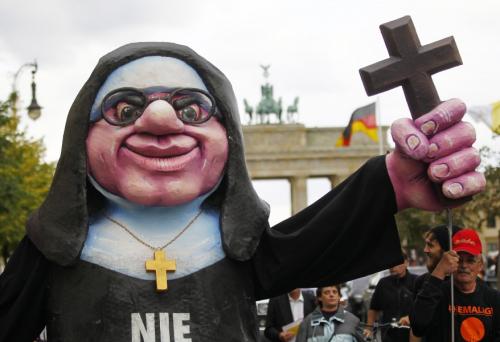Pope returns from conflict-ridden homeland trip

By ALYX BARKER
VATICAN CITY -- Pope Benedict XVI’s four-day visit to Germany was marred by a series of vociferous protests against what demonstrators denounced as the Roman Catholic Church’s rigid policies on homosexuality, contraception, divorce and the role of women within the church.
On the outward flight to his birthplace, the pontiff told reporters he felt that such opposition was “normal… it is part of our freedom. When this opposition is expressed civilly then we have nothing to say against it.” Benedict went on to say that he was reassured by the knowledge that: “Alongside the opposition, which naturally exists, a lot of people are awaiting this feast of the faith with joy.”
Only around 20 protestors greeted the Pope at the airportwith slogans such as: "Against anti-Semitism, sexism and homophobia" and "My body, my choice." However angry survivors of child abuse at the hands of catholic officials also filled the streets of Berlin. Four victims of sexual abuse gathered at the Brandenburg Gate around a large statue of a nun holding a stick to beat children with. The statue had been inscribed with the words "Never Again!”
On Wednesday, the Pope met with victims of sexual abuse committed by priests and church staff, where he said he was "moved and deeply shaken by the sufferings of the victims” the Holy Father expressed his “deep compassion and regret” over all that was done to them and their families.
This meeting with a small group of victims might do little to placate the hundreds of others who have appealed to the German church for compensation for sexual and physical abuse however, as shown by the 10,000 protesters estimated to have gathered in Potsdamer Platz on Thursday.
There, angry marchers bore signs reading “Pope Go Home” and “I was sexually abused by the church”.
Germany has seen record numbers leave the Church this year, with Reuters reporting that 181,000 had officially left Catholicism. Several German MPs boycotted the pontiff’s address to the German Parliament, and the German President Christian Wulff, himself a divorced man, told TIME that "Many ask themselves how mercifully the Church treats people who have suffered break-ups in their own lives," adding that "it was important for the Church to remain close to the people and not turn inward on itself."
The international movement ‘We are the Church’ criticised the Pope’s references to human rights in his speeches as being “incredible” as “the Catholic Church itself does not fully and completely admit human rights.” They also claimed that the Pope’s speech “overlooked the fact that his predecessors fought vehemently against freedom of conscience and opinion.” The Vatican is yet to accede to the European Convention on Human Rights, one of only two European states which have yet to do so.
Despite the noticeable presence of opposition however, the Pope’s final appearance was cheered by approximately 60,000 devout supporters.
Benedict said at the end of his visit: “I was particularly touched by the cordial welcome and enthusiasm shown by so many people in Berlin.”
The special jetliner carrying the pope landed at Leonardo da Vinci airport in Rome on Monday evening. He then travelled by car to the summer palace at Castelgandolfo in the Alban hills south of the Eternal City where he has spent the past three months, leaving the shutters closed over his apartment in St Peter’s Square.
jp-ab




